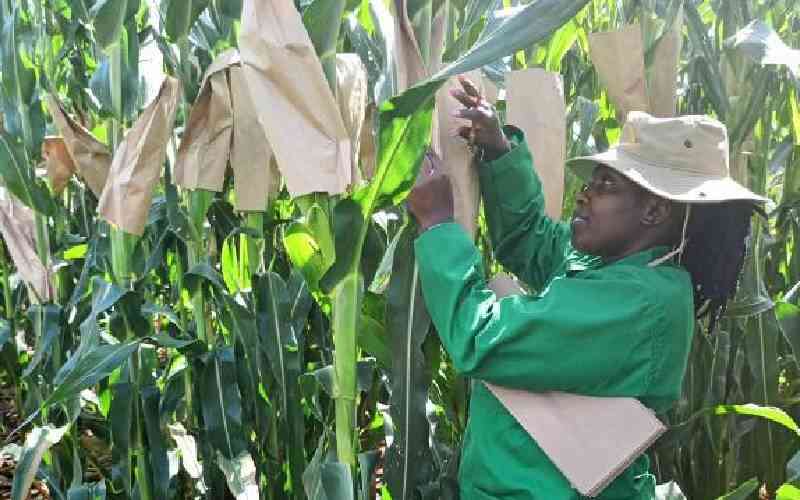
Lourine Bii, 33, is the first technician at Kiboko Plant Breeding Station in Makueni County.
In 2022, she transitioned after four years from the Kenya Agriculture and Livestock Research Organisation (KALRO) to the International Maize and Wheat Improvement Center (CIMMYT) research centre. CIMMYT is one of the research centers at CGIAR, which is a global research partnership for a food-secure future.
In her current role, she collaborates with scientists, partners and seed companies to oversee plant breeding trials in East Africa. Her duties include ensuring prompt seed delivery, managing trial planting and monitoring processes, collecting high-quality data and conducting preliminary data analysis.
Bii noted the initial learning curve and the unwavering support from her team. "I didn't seek special treatment, I simply showcased my capabilities. With CIMMYT's backing, I am now fully operational and I manage my trials and research projects without any dependency on others," she said during the interview at the breeding station.
The mother of two is a Biochemistry graduate from the University of Nairobi (UoN). She says she wanted to be a doctor while growing up or something related to science so she could "answer peoples' questions."
In agricultural research, a notable gender gap persists, particularly within the crop breeding sector. While women have often been well-represented in breeding labs and offices, they've been less present in field research work.
In Kenya, the disparity in this sector is often rooted in cultural norms and community values. This can be seen in plant breeding stations, where tasks such as mechanisation, and field and outstation trial management are disproportionately led by men.
- The Invisible Economy: Kenya's Care Policy to value women's unseen labour
- Kenya to host Africa women in STEM summit amid gender gap push
Keep Reading
Just a few years back, for example, almost all the technicians working in field stations and data collection at CGIAR Kiboko plant breeding stations were men, thus forming male-dominated teams about 90 per cent of the time.
But things are changing and more women are stepping into these field technical roles. It's also crucial to challenge mental stereotypes that, for example, automatically associate a woman with the role of an assistant or a man with the role of a lead technician.
The CGIAR has been actively working to balance technical teams in all fields in Kenya. They've done this by ensuring diverse hiring panels, considering female candidates alongside males and being vocal about it, to change mindset and send a strong message of inclusivity.
Aparna Das, Senior Technical Program Manager for the Global Maize Programme at CIMMYT said at the CIMMYT research station hosted by KALRO in Kiboko, where several partner institutions conduct research activities on crop breeding and seed systems, a simple question opened doors.
"We approached all women working there and asked if they wanted to learn how to drive a tractor - a task usually reserved for men," said Das.
He added: "To our surprise, and this shows our own bias, many women expressed interest, prompting us to implement a training programme to teach them tractor driving."
Often, in their field, he said opportunities are missed simply because of stereotypes and because no one thought to ask.
"By involving women in decision-making, rather than deciding on their behalf, we can create supporting work environments. All these women expressed a desire to learn. Since then, we never assume that a person's gender dictates their preferences for a task - rather, we ask and give the individual the opportunity to decide," he said.
Infrastructure matters too according to Das. Projects funded by Crops to End Hunger, such as the renovation of the Kenya Plant Health Inspectorate Service (KEPHIS) germplasm exchange facility done in collaboration with CGIAR Centers International Institute of Tropical Agriculture (IITA) and International Potato Center (CIP), along with similar initiatives at stations in Kakamega and Njoro, he said, invest in women's needs.
"We prioritise accessibility at the design stage", explained Gustavo Teixeira, Mechanisation Specialist and project coordinator for CGIAR Breeding Resources Initiative.
He added: "This means, for example, ensuring restroom facilities for women and men in compliance with legal requirements. Having these amenities ensures women can take breaks and address needs like breastfeeding. When procuring equipment, like planters, for example, we also consider usability for all individuals."
Bii's colleagues including research technician Andrew Chavangi and research assistant Isaiah Aleri, underscore the benefits of a gender-diverse team. "Most of the tasks we do can be done by anyone, regardless of gender," Chavangi said.
"When Ms Bii joined us, we didn't need to alter how we worked, but her presence has already proven beneficial. Considering most of our end-users, the farmers or smallholders who will use our new crops are women, having a woman offers different insights and perspectives to help research fully address the challenges of both female and male farmers in the country," he added.
Aleri also said that the majority of casual employees are female, and so having a woman on their team helps them to build strong relationships with them.
"There's a growing push to encourage women to pursue careers in science, in our field but also beyond. Female scientists can take pride in their skills and be confident in their abilities because men are ready to support them in any way they can," he said.
Bii, who has a Master's in Plant Breeding from UoN and is now contemplating pursuing a PhD, also encourages women pursuing a career in science to feel self-assured and seize opportunities.
"My organisation invested in me to acquire the necessary skills. I can now pay it forward by helping others," she says.
 The Standard Group Plc is a multi-media organization with investments in media
platforms spanning newspaper print
operations, television, radio broadcasting, digital and online services. The
Standard Group is recognized as a
leading multi-media house in Kenya with a key influence in matters of national
and international interest.
The Standard Group Plc is a multi-media organization with investments in media
platforms spanning newspaper print
operations, television, radio broadcasting, digital and online services. The
Standard Group is recognized as a
leading multi-media house in Kenya with a key influence in matters of national
and international interest.











